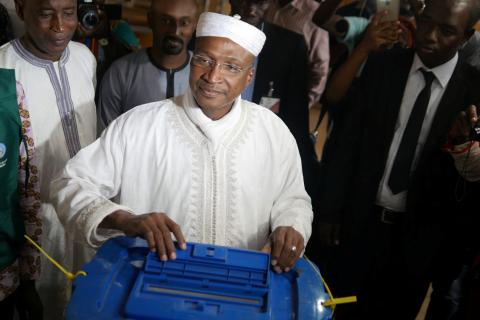Advertisement
Third candidate claims place in Mali election run-off
BAMAKO (Reuters) - Three candidates in Mali's presidential election claimed on Tuesday to have made it into a two-candidate run-off vote, adding to confusion over a poll beset by claims of irregularities and armed attacks that prevented thousands from voting.
Candidates are forbidden by law to announce results before they are officially published and by 8 p.m. (2000 GMT) on Tuesday, there was no sign of the Ministry of Territorial Administration releasing any, which did little to calm tensions.
Rival parties have given differing outlooks based on their own polling, raising the political heat in the mostly desert country, already under threat from ethnic and Islamist violence.
Mali has a history of peaceful elections in which disputes are resolved without mass protest or violence. But this election is closer and more contested than past polls, which raises the risk of trouble if candidates are unhappy with the outcome.
A spokesman for the Democratic Alliance for Peace said its candidate, gold magnate Aliou Diallo, had come second and won enough votes in Sunday's election to force a two-candidate second round poll next month.
"Given the results we compiled, we are in the second round, we claim the second place," Ibrahim Tiocary said.
His statement follows claims on Monday from incumbent President Ibrahim Boubacar Keita, who is seeking a second term and believes that he is in the lead, and rival Soumaila Cisse, whose camp said it has made it to a second round run-off against Keita.
The differing claims come as the European Union mission to observe the election said the vote was marred by irregularities, echoing concerns voiced in recent days by opposition parties.
"We observed several irregularities in the distribution of electoral cards...which were done in ways that did not follow the law," mission head Cecile Kyenge said.
"A lot of polling agents did not master the procedure well ... They were not well trained in procedure."
The African Union (AU) meanwhile commended the way the poll was carried out.
"The vote happened under acceptable conditions," said AU Mali and Sahel representative Pierre Buyoya, a former Burundian military ruler. "We call on politicians to accept the results."
"THERE'S A DANGER"
Armed attackers succeeded in shutting down 644 polling stations on Sunday, representing about 3 percent of the total. About a fifth were troubled by violence, figures from the Ministry of Territorial Administration showed.
That has fueled doubts about the election's credibility and worries that it will not fully reflect the will of Malians, large numbers of whom are spread across a vast desert where jihadists with links to al Qaeda and Islamic State roam.
Islamist militants took over the north in 2012 on the back of a Tuareg rebellion, imposing Sharia law until French troops intervened a year later to push them back. Militants have since regained territory and influence.
Jihadists have targeted foreign and local interests, taken hostages and attacked security and peacekeeping forces. The situation in Mali is still in the forefront of the former colonial power's foreign policy concerns.
The election day attacks were suspected to be mostly the work of jihadists and allied ethnic militia, who far from favoring any candidate reject democracy as unIslamic.
"There is a risk people are going to complain, they might say that because the vote was disrupted, 'we are not happy with the results,'" said Moussa Mara, campaign director for candidate Cheick Modibo Diarra, whose camp has said it would wait for the results before making any pronouncements.
"We've never had violence (over an election result) before, but this one is more close. Violence is very possible, if people take to the streets. We hope they don't, but there's a danger."
(Additional reporting by Media Coulibaly and; Writing by Edward McAllister; Editing by Richard Balmforth and Angus MacSwan)



















Add new comment